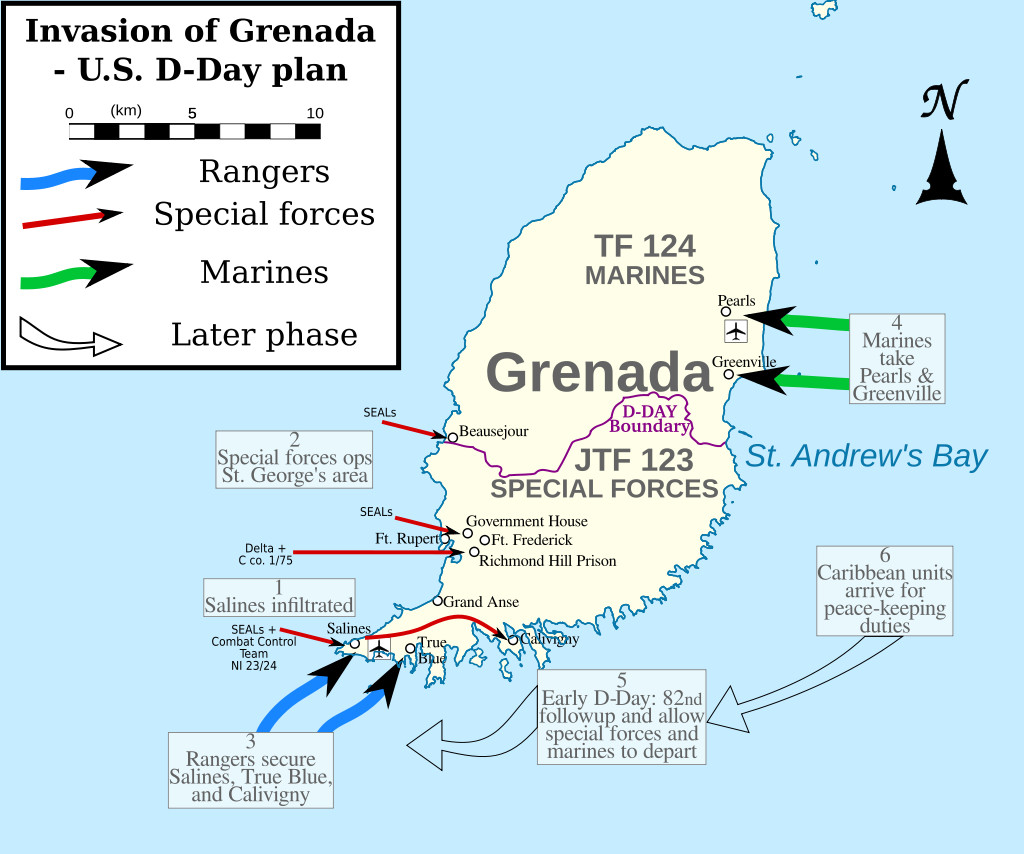Operation Urgent Fury is the invasion of Grenada by the U.S. in October 1983. This operation had been described as “hasty planning, inadequate intelligence, dismal coordination” but still, a successful mission where the U.S. Force takes control of the Grenada, American citizen and Student were rescue, and “thwart Soviet and Cuban influence in the Caribbean. This invasion had been justified by U.S. President Ronald Reagan for three main reasons: the creation of a military airport, the Cuban-Soviet influence, and the danger of US citizens. In his speech, he compares the situation to the “The nightmare of our hostages in Iran”. However, the truth is that none of these reasons can justify the action of U.S. forces in Grenada. In this article, I will go through each reason and present an argument why those reasons are either misleading or completely false.
First, according to President Reagan, the Point Salines Airport, which is under construction at the time, was being built for military use. This “military” airport can be used by the Soviet Union and Cuban to pose a threat to the national security of the USA. However, the evidence suggests that the airport was intended to be a commercial airport to help Grenada’s tourism sector and economy. When we look at Pearl airport, the older airport for Grenada, the airport had many problems that might become an inconvenience for the tourist. The geographic of the runway made bigger long-range jet plane unable to land, which mean tourist will have to take transit flight from the neighbor island that are of low quality and take times. After landing, the tourist had to choose between an expensive taxi or bus ride from the airport in the south to the capital in the north, wasting more time and causing more trouble. To solve this problem, EPICA, an international organization, suggests Grenada build a new airport to solve this problem. The idea for the airport did not come from the Soviet Union, Cuban, or Grenada themselves. Moreover, the airport was planned and built to be a civil airport from the start. According to the spokesperson of Plessey, the British company who managed the building of the airport, states that it was a purely civil airport and that there is a big difference between a military and a civil airport. In a report by Sunday Express, a UK newspaper, the spokesperson was quoted to explain the difference between two types of airport and stated that “the United States Government have been fully aware of all the facts about this airport.”. Based on these pieces of evidence, it is clear that the airport was built to be a commercial airport, and it poses no threat to the US national security as claimed by President Reagan.
Second, Grenada was believed to be under influence of the Soviet Union and Cuban as a military base to spread communism and “challenge” U.S. influence in the area. The recent Coup d’état to overthrown Maurice Bishop Government by Bernard Coard was believed by the U.S. to be back by Fidel Castro of Cuban. However, the relation between Bishop and Castro is the opposite of U.S. belief. According to Castro speech at a Funeral ceremony for Cuban who died in an invasion attack of US, he said that “that “Our people’s friendship with Bishop and Grenada was very close and our respect for the country and its sovereignty was so irreproachable”. Compared to the relation between Cuban and Coard which Castro describes as “cold and tense. The claimed that Castro would support Coard Coup d’état were opposite from the truth. Also, there is no evidence of Cuban or Soviet “military force” presence in Grenada on U.S. invasion. According to the official record from Cuban, there is 784 Cuban personnel in Grenada consist mostly of construction workers with no combat training and only 43 members of the armed force. On the side of the Soviet, Casper W. Weinberger, Defense Secretary, answered that “there is no evidence suggest that there are any Soviets participated in the hostilities against U.S. invasion.”. Moreover, the claimed that Grenada is used as an arsenal to supply Soviet Union arms to terrorist organizations is also false. According to the preliminary count submit by Marine Corps and retrieved agreement with both Soviet Union and North Korea, Grenada would have military arms and equipment enough for around 8,000 to 12,000 people, which is the same number as expected arms needed for the combination of Grenada’s army of 1,100 and People’s Militia, which are national guard, of 10,000. Based on this evidence, the imported arms and equipment is for domestic used, not to export or sent to support other terrorist groups as claim by the US government
Third, and the most urgent reason given by President Reagan, is the danger of U.S. citizens in Grenada, especially students at St. George medical school. The situation is compared to “the nightmare of our hostage in Iran”. However, there are many flaws to this argument. According to Geoffrey Bource, Vice-Chancellor of the St George medical school, the medical students were “never in danger”. Bource also receives called from General Hudson Austin to ensure the safety of the student, offering transportation, and arranging for supermarkets to open for the students. Austin also promised safe evacuation of any American citizen who wants to leave Grenada. Some of the parents who had been in touch with their children even try to contract President Reagan to “inform him that their children were safe and ask him ‘not to move too quickly or to take any precipitous actions at this time.’”. However, there was no attempt from the U.S. sided to evacuate their citizen. In comparison, Canadian planes sent to evacuate Canadian citizens were granted permission to land on Grenada only to be refused permission to take off from Barbados by the U.S. government due to the ban on air traffic. If the U.S. wants to ensure the safety of their citizen, arranging evacuation with Grenada would be the best way. The intention of the invasion is not to rescue, but to take control from the beginning.
Based on all the evidence I gather, all three reasons given by President Reagan to invade Grenada are unjustified. The airport did not pose threat to U.S. national security. There is no evidence for Grenada as Soviet-Cuban military base. And the U.S. citizen was not in danger. So, what could be the real reasons for the invasion? One reason might be the bombing of Marine camp in Lebanon a few days earlier, which might influence Reagan’s decision to invade Grenada. However, I believe the main reason is the “threat of a good example” from Grenada. The history of Grenada is one of foreign invasion and domestic violence. But with Bishop and New Jewel Movement, the country show sign of promise without help from others countries, especially from the U.S. This idea that a country can flourish without foreign intervention threatens the U.S. goal, and this example cannot be allowed to continue.
Citation List
- Bell, W. (2008). The American invasion of Grenada: a note on false prophecy. Foresight.
- STEELE, B. (1974). GRENADA, AN ISLAND STATE, ITS HISTORY AND ITS PEOPLE. Caribbean Quarterly, 20(1), 5-43. Retrieved May 1, 2021, from http://www.jstor.org/stable/23050482
- Connell-Smith, G. (1984). The Grenada Invasion in Historical Perspective: From Monroe to Reagan. Third World Quarterly, 6(2), 432-445. Retrieved May 1, 2021, from http://www.jstor.org/stable/3990988
- Caspar Weinberger oral history. (2019, October 18). Retrieved May 01, 2021, from https://millercenter.org/the-presidency/presidential-oral-histories/caspar-weinberger-oral-history
- Castro speech data base – Latin American Network Information Center, LANIC. (n.d.). Retrieved May 01, 2021, from http://lanic.utexas.edu/project/castro/db/1983/19831114.html
- Contractor in Britain Denies Airport in Grenada Is Military. (1983, November 2). The New York Times, p. 17.
- Glass, A. (2017, October 25). United States INVADES Grenada, Oct. 25, 1983. Retrieved May 01, 2021, from https://www.politico.com/story/2017/10/25/united-states-invades-grenada-oct-25-1983-244072
- Grenada. (n.d.). Retrieved May 01, 2021, from https://api.parliament.uk/historic-hansard/lords/1983/nov/01/grenada
- Lacey, S. (2018, October 25). How the invasion of Grenada was planned with a tourist map and a copy of ‘The Economist’. Retrieved May 01, 2021, from https://www.militarytimes.com/veterans/military-history/2018/10/25/how-the-invasion-of-grenada-was-planned-with-a-tourist-map-and-a-copy-of-the-economist/
- Longley, R. (2018, October 25). Grenada invasion: History and significance. Retrieved May 01, 2021, from https://www.thoughtco.com/grenada-invasion-4571025












































Interesting article! I agree that the U.S. justification to invade Grenada is not justifiable, so I believe that this is linked with other U.S. interventions in Latin America as well. As the U.S. might view Grenada as a threat of a good example, it follows a similar pattern for some countries in Latin America such as Venezuela.
Good article! The U.S. invasion of Grenada truly has two sides according to the evidences mentioned. This article is a good support for the fact that we shouldn’t believe anything right away, instead, we should search for both sides information before believing about anything.